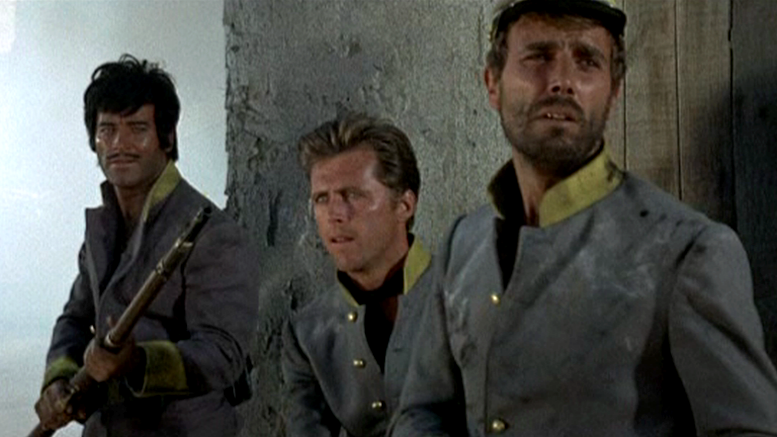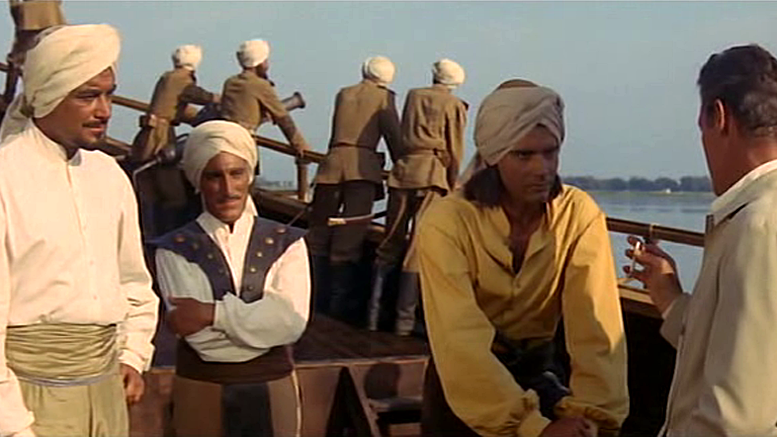 The Devil Came From Akasava is a typically haywire, free-form production from the prolific hand of jazz musician and iconic exploitation director Jesus Franco. It’s one of a batch of films he made for German producer Artur Brauner in 1971 and 1972, the best known of which is undoubtedly cult favourite Vampyros Lesbos. It was a good period for him, and this shares many of the aesthetic trappings of that film: it looks good, has a great, groovalicious soundtrack and is performed by a selection of capable and familiar actors. It seems that Brauner’s understanding of cinema’s commercial requirements – he also produced both Black Beauty and The Garden of the Finzi Contini’s the same year – chimed well with Franco’s more idiosyncratic outlook, in terms of results at any rate.
The Devil Came From Akasava is a typically haywire, free-form production from the prolific hand of jazz musician and iconic exploitation director Jesus Franco. It’s one of a batch of films he made for German producer Artur Brauner in 1971 and 1972, the best known of which is undoubtedly cult favourite Vampyros Lesbos. It was a good period for him, and this shares many of the aesthetic trappings of that film: it looks good, has a great, groovalicious soundtrack and is performed by a selection of capable and familiar actors. It seems that Brauner’s understanding of cinema’s commercial requirements – he also produced both Black Beauty and The Garden of the Finzi Contini’s the same year – chimed well with Franco’s more idiosyncratic outlook, in terms of results at any rate.
When Professor Forrester (Ángel Menéndez) disappears into the jungle in Akasava, his whereabouts become a subject of interest for a large number of people. Secret Agent Jane Morgan (Soledad Miranda) is after the source of a mysterious form of radiation which he is reputed to have discovered. Sir Philip (Siegfried Schürenberg), of Scotland Yard, wants to find out who it was who killed the dead man found in Forrester’s office back in London. And as for Rex Forrester (Fred Williams), well, all he’s interested in is finding out exactly what’s happened to his Uncle.
Things rapidly become increasingly complicated: Jane is forced to kill an enemy agent and is left with no option but to hide his body, but somebody steals it before she can do so. Rex embarks upon an affair with Ingrid Thorssen (Ewa Strömberg), whose husband owns the clinic next door to the Professor’s house (and was coincidentally the last person to see him alive). And it becomes clear that the whole area is suffering from an epidemic of a particularly virulent and incurable form of sleeping sickness which renders its victims comatose.
Rex discovers that his Uncle’s vanishing act has something to do with a mysterious crystal, which he’d unearthed in a hidden cave and which has the power to turn stone into gold. Unfortunately, this crystal is also both the source of the radiation and the cause of the sleeping sickness; a particular problem for Rex, as he’s being unknowingly used as a carrier to smuggle it back to London. Fortunately, he’s not as naïve as he seems, and is using his situation as a way of tracking down and gaining evidence against the mastermind behind the assorted criminal activities: Lord Kingsley (Walter Rilla), a wealthy philanthropist and the sponsor who finances the Thorssen’s dodgy clinic.
 This is solid, entertaining stuff that might appeal more to those who don’t buy into the Franco myth than those who do. It has many of the trademark touches of the director: a screwy screenplay that mixes old-fashioned espionage with unlikely sci-fi trimmings; serious continuity errors; inconsistent pacing; a simple yet horrendously confused story (many parts of which are simply dropped as soon as they’re introduced). But he’s behaving himself here; the plot may not make a great deal of sense, but at least is does have some kind of narrative. It feels less improvisational than much of his other work, which tends to be more concerned with following the director’s own predilections rather than with the needs and requirements of the viewer.
This is solid, entertaining stuff that might appeal more to those who don’t buy into the Franco myth than those who do. It has many of the trademark touches of the director: a screwy screenplay that mixes old-fashioned espionage with unlikely sci-fi trimmings; serious continuity errors; inconsistent pacing; a simple yet horrendously confused story (many parts of which are simply dropped as soon as they’re introduced). But he’s behaving himself here; the plot may not make a great deal of sense, but at least is does have some kind of narrative. It feels less improvisational than much of his other work, which tends to be more concerned with following the director’s own predilections rather than with the needs and requirements of the viewer.
As mentioned, at least some of this is down to the steadying hand of Artur Brauner, who was behind a variety of successful films throughout the fifties and sixties (including the not entirely dissimilar Dr. Mabuse series instigated by The 1,000 Eyes of Dr. Mabuse). Ladislas Fodor, a regular writer for Brauner, also had a hand in the script, and it’s not hard to surmise that he was responsible for the sense of narrative drive. Franco also benefits from working with one of his more capable cinematographers in Manuel Merino; admittedly, the film is chockfull of unnecessary zoom shots, but on the whole it’s nicely colourful and very easy on the eyes.
And, of course, there’s a lot of fun to be had. Franco was never overly concerned with realism, and blatantly uses some handy botanical gardens as a stand in for the jungle, figuring that playing a three second loop of a tropical bird over the soundtrack will be enough to fool the viewer. Of course, the fact that there are frequent stretches of neatly tended lawn and well designed pools does little to help the sense of authenticity. Similarly, the unfortunate Professor Forrester is depicted as a very talented man: his occupation is described varyingly as being a geologist, archaeologist and mineralogist, despite all which he has a lectureship at the ‘Institute of Tropical Diseases’. Some of this humour is intentional – Jane’s attempts to dispose of the body while just about every other character is watching on, the decadent West End brothel ‘Chez Jackie’ – some less so, but it all adds to the fun.
I guess The Devil Came From Akasava could be described as a late entry into the eurospy format, but Franco worked on the periphery of the genre throughout his career, and hardly any of his films can be described as fitting clearly into it. This is certainly less arch than the likes of Sadisterotica and Lucky the Inscrutable, borrows a key element from Kiss Me Deadly and also owes a lot to the Edgar Wallace adaptations of the early sixties (Wallace’s son, Bryan Edgar, is credited with being the unlikely source for the story here). But I can’t remember many of Wallace’s stories including one of their main characters coming back to life as a virtual zombie and stalking through the streets in search of his attacker.



Comments